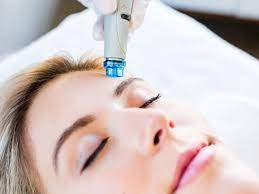HydraFacial treatments have become increasingly popular for their ability to cleanse, exfoliate, and hydrate the skin in a single session. However, many clients experience a common concern: their Skin Looks Worse After Hydrafacial treatments. Understanding the reasons behind these initial reactions can help you manage expectations and navigate the recovery process effectively.
In this article, we'll explore the reasons why skin looks worse after HydraFacial treatments and provide you with valuable tips for achieving the best results.
Why Skin Looks Worse After HydraFacial
- Skin Purging: What It Means One of the most common reasons skin looks worse after a HydraFacial is the phenomenon known as skin purging. This occurs when the treatment accelerates the shedding of dead skin cells and unclogs pores. While purging is a natural process, it can lead to temporary breakouts or irritation.
- Purging typically happens when active ingredients in the HydraFacial, such as salicylic acid, stimulate cellular turnover. This process can bring underlying impurities to the surface, resulting in visible blemishes.
- Sensitivity to Ingredients HydraFacial treatments often use various serums and exfoliating agents. For some individuals, these ingredients can cause temporary redness, irritation, or sensitivity. If you have sensitive skin or specific allergies, it's essential to communicate these concerns with your aesthetician before the treatment.
- After the treatment, your skin might react to ingredients that are new to it, leading to a worse appearance initially. The redness and irritation may subside within a few days as your skin adjusts.
- Hydration Imbalance Although HydraFacial is designed to hydrate the skin, an imbalance can occur. If your skin was dehydrated before the treatment, it might react negatively to the sudden influx of moisture. This reaction can manifest as puffiness, redness, or even temporary breakouts as your skin recalibrates.
- Maintaining a consistent skincare routine post-treatment is vital to support your skin’s hydration levels and overall health.
- Excessive Exfoliation HydraFacials involve multiple steps, including exfoliation. If your aesthetician uses a more aggressive approach, your skin may become irritated or overly sensitized, leading to an initial worsening of its appearance. This can be particularly true for individuals who have recently undergone other exfoliating treatments.
- It's crucial to choose an experienced provider who understands your skin type and can tailor the treatment accordingly.
Tips for Managing Initial Reactions
- Communicate with Your Aesthetician Before your HydraFacial, be open about your skin type, concerns, and any previous treatments. This information will help your aesthetician tailor the treatment to your needs, minimizing potential adverse reactions.
- After the treatment, don’t hesitate to reach out if you experience unexpected side effects. Your provider can offer specific advice to help manage any reactions.
- Follow Post-Treatment Care Instructions Following the treatment, your aesthetician will provide aftercare instructions. Adhering to these guidelines is crucial for minimizing adverse reactions and ensuring optimal results.
- Common post-treatment tips include avoiding direct sun exposure, refraining from intense workouts, and steering clear of harsh skincare products for a few days. These precautions will help your skin recover without additional stress.
- Stay Hydrated Hydration is key to maintaining healthy skin, especially after a treatment like HydraFacial. Drinking plenty of water helps your skin recover and flushes out toxins that may contribute to breakouts.
- Additionally, consider incorporating a gentle, hydrating moisturizer into your routine to lock in moisture and support your skin’s healing process.
- Give It Time Understand that initial reactions are often temporary. Many clients notice significant improvements in their skin's appearance within a few days to a week following their treatment.
- Patience is essential. Instead of worrying about initial breakouts or redness, focus on the long-term benefits of the HydraFacial treatment.
Ideal Candidates for HydraFacial
While HydraFacial can benefit most skin types, it’s particularly suitable for individuals looking to address specific skin concerns. If you’re considering this treatment, here are some ideal candidates:
- Those with Oily or Acne-Prone Skin If your skin is prone to breakouts or excess oil, HydraFacial can help clear clogged pores and reduce the frequency of acne flare-ups.
- Individuals with Dull or Dehydrated Skin HydraFacial provides deep hydration and revitalization, making it an excellent option for those with dull, tired-looking skin.
- People Seeking Preventative Care Regular HydraFacial treatments can help maintain skin health and prevent early signs of aging. If you’re looking to invest in your skin's long-term health, this treatment can be beneficial.
When to Seek Professional Help
If your skin looks worse after a HydraFacial and does not improve within a week, it may be time to consult a dermatologist or your aesthetician. Persistent redness, swelling, or discomfort could indicate an allergic reaction or another underlying issue that requires professional attention.
Conclusion
While it's common for skin to look worse after a HydraFacial treatment, understanding the reasons behind these initial reactions can help you manage your expectations. By communicating with your aesthetician, following post-treatment care instructions, and practicing patience, you can navigate the recovery process effectively.
Remember, the goal of a HydraFacial is to enhance your skin's health and appearance over time. By addressing any concerns and taking proper care of your skin post-treatment, you'll be well on your way to achieving the glowing results you desire.
By keeping these tips in mind, you can minimize the chances of your skin looking worse after HydraFacial and ensure that you get the most out of this popular skincare treatment. With proper care and understanding, you'll be able to enjoy radiant, healthy skin that reflects your best self.





Comments